- Home
- Anne Hampson
Stars of Spring
Stars of Spring Read online
STARS OF SPRING
by
Anne Hampson
When Joanne inherited a farm in the lovely Douro district of Portugal, it seemed the answer to a problem, as she now had five-year-old Glee to look after.
The only fly in the ointment was that the farm was on the estate of Dom Manoel Alvares—and he wanted it himself!
CHAPTER ONE
CONSCIOUS of being watched, the child glanced up. A swift mischievous grin transformed her angelic features and a smile of tender amusement rose to Joanne’s lips. Following the direction of her gaze, the man stared through the window, watching the child as she disappeared round the corner of the house. His cool dark eyes flickered to Joanne ... and to her left hand. It lay in her lap, half covered by the folds of her skirt.
‘A relative of yours?’ His voice held the lazy affectation of boredom; clearly the inquiry was a gesture of politeness and Joanne replied in tones of crisp formality, for in one brief hour the arrogant Dom Manoel Alvares had aroused in her a dislike so intense that she no longer made any effort to disguise it.
‘Yes, she’s a relative. Glee is my—’
‘Mummy, I’m hungry!’ Like a small hurricane she entered, tossed her small satchel on to the couch, and stood regarding the visitor with interest for some moments, noting the sign of disapproval as his eyes moved from her animated little face to the satchel flung against the cushions.
‘What were you doing out there in the garden?’ How quickly she grew, thought Joanne rather sadly. Glee would be six in less than two months’ time.
‘Burying a worm. It got itself in the sunshine, and it hurts it if you don’t help it to get back under the soil again quickly.’ Her chestnut hair—so like Joanne’s—had been neatly plaited and held with two pretty blue ribbons, but it now fell untidily on to her shoulders, and she had one ribbon in her hand. Her grandmother had always declared it would be a miracle if ever Glee came home without having lost anything. Her large, almond-shaped eyes, so soft and grey, were still fixed on the formidable stranger, but he was looking at Joanne with a mingling of puzzlement and disbelief.
‘Are you the man who wants to buy Mummy’s farm?’ asked Glee, without any trace of shyness. ‘She won’t sell it to you because we’re going to live in it ourselves.’
‘Glee dear,’ put in Joanne hastily, ‘hang up your satchel and then go to the kitchen. Auntie Chris will give you something to eat.’
Obediently she left the room, dragging her satchel along behind her.
‘I must apologize.’ Dom Manoel’s voice carried an unmistakable note of censure. ‘Evidently I should be addressing you as Mrs. Barrie. Why didn’t you correct me?’
‘It’s of no importance.’ Why waste time explaining when her one desire was to be rid of this objectionable foreigner who had spent the last hour trying to force her to part with her property? Deliberately she glanced at the clock; the action produced no visible change in his expression, yet Joanne sensed a sudden tightening of his mouth.
‘You didn’t say anything about farming the land yourself,’ he began in some perplexity. ‘If that were the reason for your refusal of my offer then why couldn’t you say so?’
Her chin lifted at his tone, and a sparkle entered her eyes. What an arrogant voice—and it was made to sound more arrogant still by the slight accent and the emphasis he put on certain words.
‘I didn’t feel obliged to inform you as to my future plans,’ she replied frigidly. ‘What I choose to do with the farm is entirely my own affair.’
His dark eyes glinted dangerously, but he maintained a perfectly unmoved composure. He would rarely lose his temper, Joanne concluded—and yet she felt this quiet control could be far more unpleasant than any violent show of emotion—were one to find oneself in his power.
‘Your husband—is he willing to leave his work here, and move to Portugal?’
She hesitated, then gave a shrug of resignation,
‘I have no husband. I’ve never been—’
‘Your pardon, Mrs. Barrie; I’m sorry. You’re so young to be widowed, and left with a small child—’ Pausing, he regarded her with renewed perplexity. ‘You must have been very young indeed when your little girl was born?’
A question ... which she decided not to answer, and after a moment or two he stirred, then leant back in his chair. Joanne frowned. He was making himself more comfortable instead of preparing to leave.
‘You can’t possibly farm this land alone,’ he stated firmly, adding that, in view of her misfortune in losing her husband, he would again increase his offer. He paused, this time to make a mental calculation, and before he could continue Joanne said, on a definite note of finality,
‘My mind’s made up, Dom Manoel, I’m not selling the farm.’ She glanced coldly at him. ‘You’ve managed without the land all this time, so it can’t be of such vital importance to you.’
A gesture of his hands betrayed his impatience. His lean aristocratic features became set in lines that gave evidence of his acute distaste for his task. Nevertheless, he persevered.
‘Originally it formed part of the Solar de Alvares estate. Naturally it is my desire to purchase it.’
Joanne lapsed into thoughtful silence, wondering what this farm was like, this farm in the lovely Douro district of Portugal. It had been left to her by a great-aunt, Dona Amelia Lucena, an eccentric who, having quarrelled with all her relatives in Portugal, left the property to the youngest child of her niece, Mrs. Barrie, whom she had never even met.
What was his house like?—the Solar de Alvares? From what her grandmother used to tell her Joanne felt it must be very grand. A great palacete, a patrician of rare line and beauty, reclining gracefully in the sun, spread out on a wide spur of the rolling hill above the Douro valley, with the purple richness of the vineyards pressing right up to the edge of its vast park. Its main facade, her grandmother had said, was flanked by two massive granite towers, and its grounds were a paradise of spreading lawns and statuary, of flower borders and ornamental water gardens.
And close by was the farm. Minute by comparison to the vast Alvares estate, it had been appropriated to a descendant of Nuno Alvares more than a hundred and fifty years ago, and had, therefore, become separated from the main estate.
Immediately on inheriting the property Joanne had been approached by a firm of solicitors engaged by Dom Manoel to make her an offer for it. In ordinary circumstances she would willingly have sold the farm, but a few months prior to her inheriting it events had occurred which were later to influence her, and make her exceedingly thankful that a means of livelihood had so opportunely presented itself.
On the failure of the solicitors to purchase the property Dom Manoel had decided to come to England himself, confident of persuading Joanne to sell. Judging by the way in which he had received her decision she felt sure no one had ever before had the courage to oppose his will.
He now moved impatiently and she looked up.
‘There isn’t anything more to say on the matter. I’m not selling my property.’
The compression of his lips portrayed his anger. Joanne was suddenly curious to read his thoughts. That he disliked her was plain enough; he also considered her to be both foolish and stubborn. His offer was good, and Joanne fell to wondering whether, had he not been so arrogant and sure of himself immediately on meeting her, she would have obliged and let him have the land he so greatly desired.
‘This idea of farming it alone,’ he said imperiously. ‘You’re just not capable!’
‘Certainly I am!’ One could do most things, when necessity drove. And it was of vital necessity that she make a living for herself and Glee.
‘Ridiculous! You don’t know what state the place is in. You couldn’t possibly occupy th
e house—and as for the land, well, if s been neglected for years.’
Joanne smiled faintly at this ruse. Did he believe for one moment that she would be influenced by that kind of talk?
‘If it’s in such a dilapidated state, then why have you made me so generous an offer?’ she asked, her grey eyes wide and challenging.
‘If I buy this property from you the house will be demolished. I’m interested only in the land; I want it back where it belongs.’
‘I’m sorry to disappoint you,’ and she added, in tones less cold, ‘I must farm it, Dom Manoel, for I have no other means of making a living.’
He frowned at that and for a moment Joanne expected to be questioned as to her financial position. However, he thought better of it and all he said was,
‘You’ll never make a living out of this farm.’
‘I can try.’
His dark eyes flashed, then roved her contemptuously.
‘You’ll fail. Labour is not easy in this area—even if you could afford it,’ he added, bringing a hint of angry colour to her face. ‘No, it’s far better for you to accept my offer and find some small business for yourself in your own country.’
Her flush deepened. Who did he think he was? Let him keep his orders for the poor labourers who had the misfortune to work in his vineyards! She stood up, and waited in an attitude of impatience for him to do the same. His eyes seared into her and she wondered what sort of danger that expression would portend to anyone subordinate to his authority.
Presently he rose, and against her will she admitted to being profoundly impressed by the sort of magnificent aloofness with which he held himself. So tall and lean, with the typical dark complexion of the Alvares family and the widow’s peak cutting low into his brow, he seemed to typify some great mediaeval overlord, and Joanne could almost see his lackeys cringing before his august and overpowering presence.
Well, for once he had met his match, she mused with extreme satisfaction. And if she ever did come to sell the farm, the haughty Dom Manoel would be the last person to whom she would give the option of buying.
‘I’m afraid I have work to do,’ she said without any effort at politeness.
But he did not leave immediately, instead he put to her a proposition that not only increased her anger and indignation, but also strengthened her determination to make an outstanding success of her farm.
He drove away in the taxi which had been waiting, and with a deep sigh of relief Joanne went into the kitchen where her sister was busy feeding sandwiches to Glee.
‘I don’t like that man,’ submitted Glee, chewing vigorously. She had an attractive little turned-up nose and it went higher into the air as she added, ‘He’s a snob.’
‘Devastatingly handsome, though.’ Chris put a couple more sandwiches before the child and then eyed Joanne questioningly. ‘How did you go on? Is he a snob, as this little brat says?’
‘Snob’s a mild word.’ She glanced at Glee, her eyes resting on her long slender fingers as she began to pick out the meat from between two pieces of bread. ‘He was as mad as could be about my decision to retain the property. Kept on increasing his offer—’ She broke off, laughing. ‘He thought I was a widow, so he very magnanimously increased his offer again.’
‘A widow?’ Chris blinked at her. ‘Why should he think that?’
With a slight gesture of her head Joanne indicated Glee, who appeared to be completely absorbed in her food.
‘He reached the conclusion that Glee was mine.’
Chris glanced from one to the other.
‘That’s understandable—though you don’t look old enough.’ She gave her attention to Glee, telling her sternly to eat her bread. ‘That doesn’t explain why he should think you’re a widow?’ she added on a puzzled note. Joanne explained what had happened and Chris said she supposed Joanne had put him right about the matter.
Joanne shook her head.
‘I couldn’t be bothered. I wanted to get rid of him.’
‘But—’ Chris stared—‘he took it for granted you were a widow— and you let him believe it?’
‘What does it matter? I’ll never see him again.’
‘You might; he’ll be your nearest neighbour.’
‘His lands are too vast for him ever to come into contact with me.’
‘I still think you should have told him the truth. Chris frowned and shook her head. ‘It was a pity she ever began calling you M—’ Joanne raised a hand, for Glee now listened with interest, the food on her plate forgotten. The conversation between Joanne and Chris followed other lines until, about ten minutes later, one of Glee’s little friends called to see if she were going out to play.
‘Keep to the garden,’ Joanne said, wiping the crumbs off Glee’s chin with a handkerchief. ‘You mustn’t go out on to the road.’
‘No, we won’t.’ A roguish light appeared in those grey eyes which at times could be so serious, and even sad. ‘If you can’t find me I won’t be out in the road, but only hiding in the bushes.’
Joanne regarded her sternly.
‘Just you play where I can see you.’
‘Okay,’ returned Glee cheerfully, and disappeared into the garden.
‘No wonder they called her Glee,’ remarked Chris a few minutes later as, having made a cup of tea, she sat with Joanne at the kitchen table watching the two children through the window. ‘She laughed almost from being born—do you remember?’
Joanne nodded, thinking of the thrill she had experienced at becoming an aunt. It had given her a feeling of importance, for she was only eighteen when Glee was born.
Two years later Glee’s mother died and, unable to settle, Roger had taken a post abroad, bringing his daughter home to be cared for by his mother and sisters. When the child cried for her mother it was always Joanne who took her up, holding her tenderly and comforting her. No one else could soothe her in this way and it was soon apparent that Glee was beginning to identify Joanne with her mother. And as the child’s happiness was the sole concern of them all, the habit of referring to Joanne as Mummy was never checked. As time went on it became more and more difficult to do anything about it, for although Glee knew Joanne was her aunt she stubbornly refused to call her anything else but Mummy.
‘This is going to cause you some trouble,’ Mrs. Barrie had warned. ‘We should make her call you Aunt.’
‘It’s too late—’ Joanne shook her head. ‘It would be quite impossible now.’
‘But people who don’t know you...’
Joanne had only laughed, and Chris had jokingly suggested she wear a wedding ring.
‘Don’t be so frivolous about it,’ Mrs. Barrie said angrily. ‘A wedding ring would spoil Joanne’s chances of getting married.’
‘So will the fact of Glee’s calling her Mummy. Nice young men fight shy of girls with babies who came in by the back door.’
‘Really, Chris!’ protested Mrs. Barrie. ‘These modern expressions are so indelicate!’
‘That’s not a particularly modern expression,’ submitted Chris. She was laughing at her mother’s look of distaste, and so was Joanne. Mrs. Barrie gave up, but added in a deeply troubled tone,
‘Much as I’ve grown to love Glee, I do wish Roger would come and take her away, because if he doesn’t I can foresee a great deal of embarrassment for you, Joanne dear.’
But she did not live to witness any embarrassment Joanne might suffer, and only a month after her death Roger returned to England—bringing his new wife with him. Mavis, though willing to take the child, was clearly not over-enthusiastic about the idea. Joanne was quick to sense her reluctance; she felt deeply troubled about the child’s future and offered to keep her.
Roger’s relief was apparent, but he obviously felt he should make some sort of protest.
‘You can’t. Now Mother’s gone who is there to look after her while you’re at work?’
‘We’re managing now,’ she pointed out. ‘Chris is always in when Glee comes from school.’
>
‘For the present, yes, but only because she and Miles are living here—’
‘We shan’t be getting a house of our own yet,’ Chris had put in, agreeing with Joanne that the lack of enthusiasm in both her father and stepmother spelt unhappiness for Glee. The upheaval of being removed from those she had grown to love would be sufficient to cause some psychological unbalance for a time, but to go to people who had little or no interest in her would be disastrous.
As neither Roger nor his wife made any further protests it was agreed that Glee should remain with her two aunts, and Roger would continue to pay for her keep and her clothes. But even before the arrival of Mavis’s first child Roger had written to say that, as he could no longer afford the money for Glee, she would have to come and live with him and Mavis.
‘They don’t really want her,’ said Chris angrily. ‘Don’t you see, they know very well we won’t part with her, and this is just a way of getting out of paying!’
Although Joanne herself was angry, she could understand her brother’s difficulty, for he did not earn a high salary. And so it was agreed that he should be relieved of the burden of his child’s keep.
It would not have mattered very much, for Chris and her husband contributed towards the expenses of the house, and Joanne herself earned a fairly good salary as assistant in the bank, but a few months ago Miles had been offered a post in Scotland. He was already working there, and looking for a house. Chris and Miles had offered to take Glee, and that seemed the only sensible way out of Joanne’s difficulty. Joanne knew she would feel the loss acutely, but believed Glee would be given a far better chance in life if she were brought up with Chris and Miles. However, they had reckoned without Glee, who at first merely raised a strong objection to the idea, but later, when it seemed she would be forced to leave her beloved Joanne had, after a bout of uncontrollable weeping, turned right in on herself and scarcely spoken a word to any of them for more than two days.
‘Leave her,’ said Miles, though in deeply troubled tones. ‘She’ll become used to the idea.’
‘I can’t—’ Joanne shook her head determinedly. ‘It’s no use, Miles, she’ll have to stay with me.’ And it was amazing how relieved she felt on making the decision. To have parted with Glee, even though she would see her at holiday times, was something on which Joanne had not allowed her thoughts to dwell.

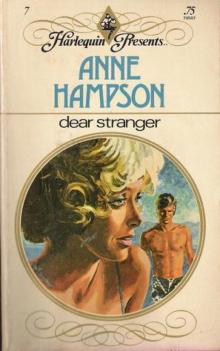 Dear Stranger
Dear Stranger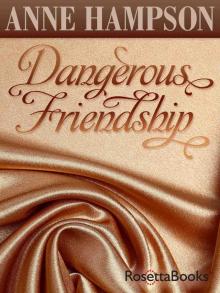 Dangerous Friendship
Dangerous Friendship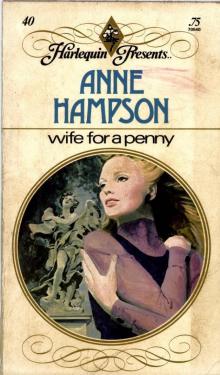 Wife for a Penny
Wife for a Penny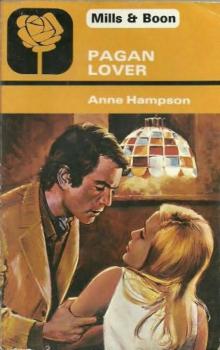 Pagan Lover
Pagan Lover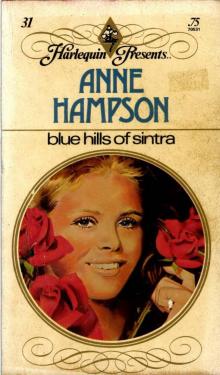 Blue Hills of Sintra
Blue Hills of Sintra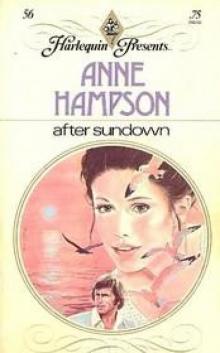 After Sundown
After Sundown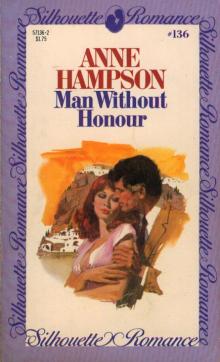 Man Without Honour
Man Without Honour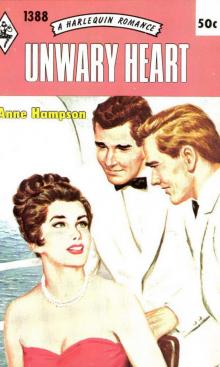 Unwary Heart
Unwary Heart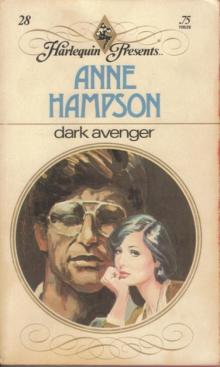 Dark Avenger
Dark Avenger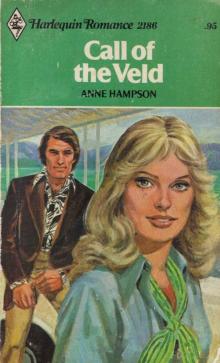 Anne Hampson - Call of The Veld
Anne Hampson - Call of The Veld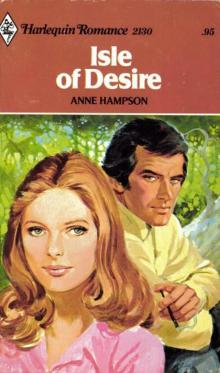 Isle of Desire
Isle of Desire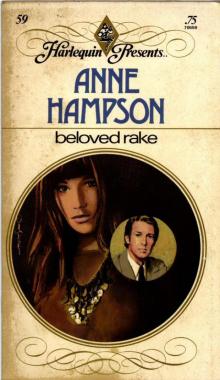 Beloved Rake
Beloved Rake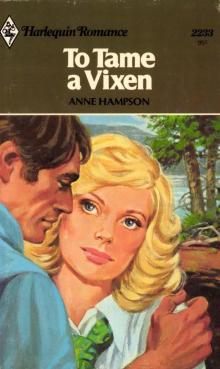 To Tame a Vixen
To Tame a Vixen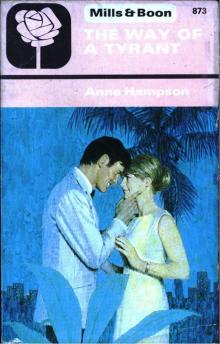 The Way of a Tyrant
The Way of a Tyrant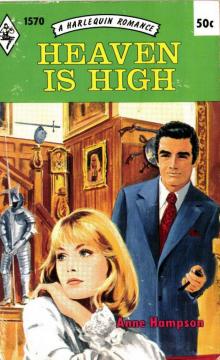 Heaven is High
Heaven is High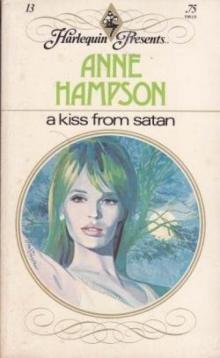 A Kiss From Satan
A Kiss From Satan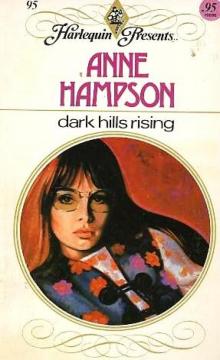 Dark Hills Rising
Dark Hills Rising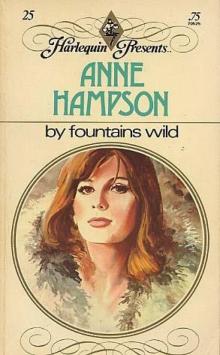 By Fountains Wild
By Fountains Wild Second Tomorrow
Second Tomorrow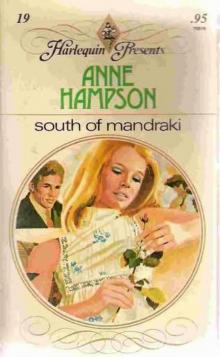 South of Mandraki
South of Mandraki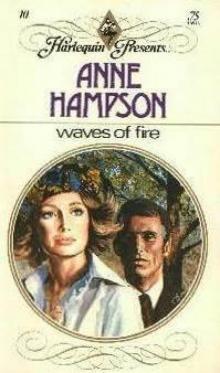 Waves of Fire
Waves of Fire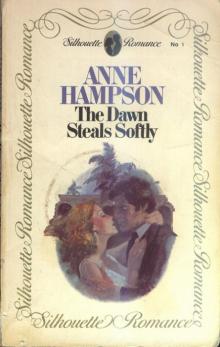 The Dawn Steals Softly
The Dawn Steals Softly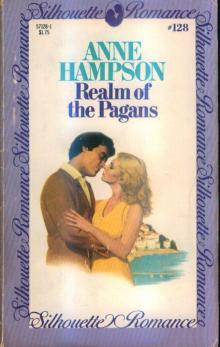 Realm of the Pagans
Realm of the Pagans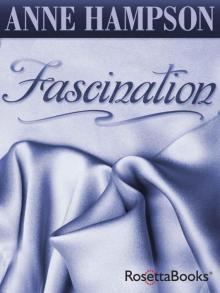 Fascination
Fascination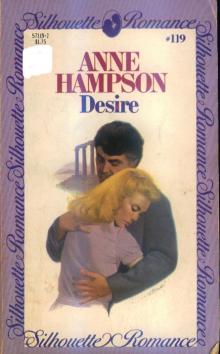 Desire
Desire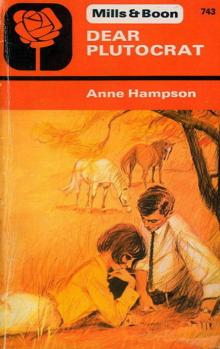 Dear Plutocrat
Dear Plutocrat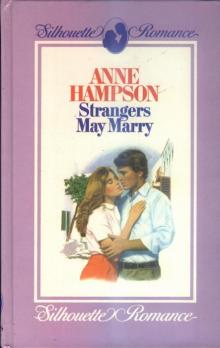 Strangers May Marry
Strangers May Marry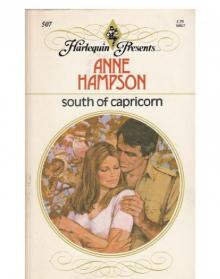 South of Capricorn
South of Capricorn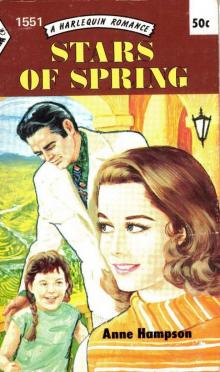 Stars of Spring
Stars of Spring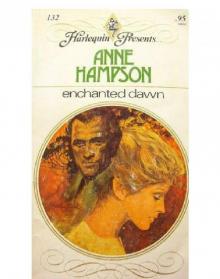 Enchanted Dawn
Enchanted Dawn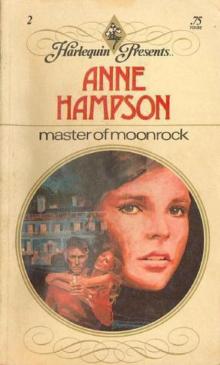 Master of Moonrock
Master of Moonrock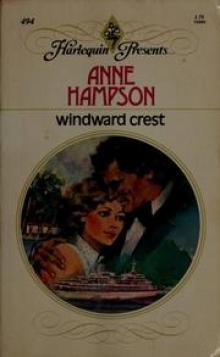 Windward Crest
Windward Crest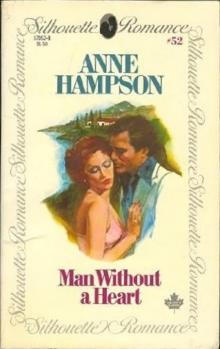 Man Without a Heart
Man Without a Heart